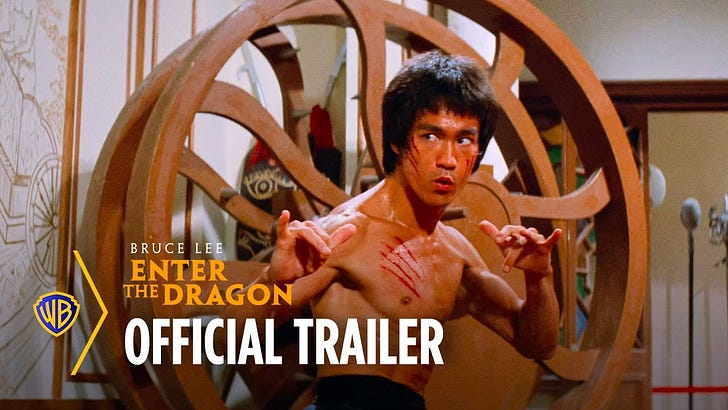We are going to see a “synthetic” sequel to Enter the Dragon.
[In August 2007, the now-defunct Warner Independent Pictures announced that television producer Kurt Sutter would be remaking the film as a noir-style thriller entitled Awaken the Dragon with Korean singer-actor Rain starring.[90][91][92] It was announced in September 2014 that Spike Lee would work on the remake. In March 2015, Brett Ratner revealed that he wanted to make the remake.[93][94] In July 2018, David Leitch was in early talks to direct the remake.[95] As of 2024, there are no further updates on this project.]
Ever since I was a child I was enamored by unconventional heroes. Harry Houdini. Evel Knievel. Rocky Balboa. Bruce Lee.
I realize today that what appealed to me about these unconventional heroes is that they were not just the best in their field, but that they actually created all new categories (fields) of doing; not summiting but turning over what had been the previous “pinnacle” — building brand new mountains of possible.
Today it seems the same with the Law. #AI/#ML, having come out of its long infancy since the 1950’s, and riding last year 2023 “The Year of AI” too broke out of its former category of being an additive technology to our best and most useful tasks (search, maps, content suggestion, web interfaces) to stand in the arena as a Player Technology of One, just like #BruceLee.
Some fields more instantly suggest a depth of impact of this thundering technology, with new ai news breaking weekly, then daily, then multiples in one day. Accounting, finance, compliance, content, service.
Yet one field, the law, screams in singular adoptive delight. And not just in the ways we thought of yesterday. Yes, we can get our docs done, our research completed (mind the fugazi cases and citations!), our crm enhanced, our client service improved and better informed (a long time coming).
And we can and will do even more with ai, and also new things. Many things we are only beginning to conceive of today. Autonomous service to clients. Non-human binding mediations at a fraction of the cost and time and with better accuracy. Advance war-gamed adversarial matters; sped along by #data (instead of billable hours), at new cost benefit to the client. Access to justice not continuing as a long-bemoaned “when will we?” — giving way to instant free 24/7/365 effective multiple-lawyer help at the speed of a smart phone chat entry.
Those who came before with noble effort, and I am thinking of Atrium here, seemed to try to fit new technology into the old forms. Even with the education of Nolo and LegalZoom - just delivering the goods in new ways - still lawyers and law firms are among the most demanding clingers. Change is difficult in any field, and becomes more dangerous in the multi-regulated law space where competition easily gets if obliquely translated instead into personal professional accusation………as anyone who has ever tried a case knows.
No, what we now know of technology is that it will advance, and the pieces of society, culture, and business (law practice) will re-orient around it, creating new forms.
After plaintive screams peppered with stark and nebulous-yet-certain parade of dooms — about the computer, the Internet, e-mail, #Y2K, apps, algorithms — now AI - civilization has a way of adopting anyhow those technologies which make things faster, easier, and less expensive.
And the same is true today especially with the law and our emerging AI/ML technologies which will do some existing tasks better, and which will create whole new categories of function; unstoppable.
The new #ai/ml-enabled law is Bruce Lee; Enter the DrAIgon.




There is already a widespread and growing sense among the plebs that the courts are illegitimate. Unequal access to "justice", de facto unequal rights before the Law, ubiquitous use of coerced false confession ("plea bargain") in criminal prosecution, and the notorious American gulag all contribute to this sense.
Will AI make this better, or worse?